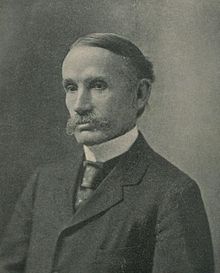John Bates Clark
| John Bates Clark | |
|---|---|
 |
|
| Born |
January 26, 1847 Providence, Rhode Island |
| Died | March 21, 1938 (aged 91) New York City |
| Nationality | American |
| Institution |
Carleton College Johns Hopkins University Columbia University |
| School or tradition |
Neoclassical economics |
| Alma mater | Amherst College |
| Influences | Karl Knies |
| Influenced | Thorstein Veblen, Friedrich Hayek, Frank Fetter, Frank Knight, Henry Moore |
John Bates Clark (January 26, 1847 – March 21, 1938) was an American neoclassical economist. He was one of the pioneers of the marginalist revolution and opponent to the Institutionalist school of economics, and spent most of his career as professor at Columbia University.
Clark was born and raised in Providence, Rhode Island, and graduated from Amherst College, in Massachusetts, at the age of 25. From 1872 to 1875, he attended the University of Zurich and the University of Heidelberg where he studied under Karl Knies (a leader of the German Historical School). Early in his career Clark's writings reflected his German Socialist background and showed him as a critic of capitalism. During his time as a professor at Columbia University however, his views gradually shifted to support of capitalism and he later became known as a leading advocate of the capitalist system.
After his return from 1877 onward Clark published several articles most of them edited later in The Philosophy of Wealth (1886). There he formulated an original version of marginal utility theory, principle already published by Jevons (1871), Menger (1871), and Walras (1878).
Until 1886 Clark was a Christian socialist reflecting the view of his German teachers that competition is no universal remedy – especially not for fixing wages. Clark writes:
...
Wikipedia
